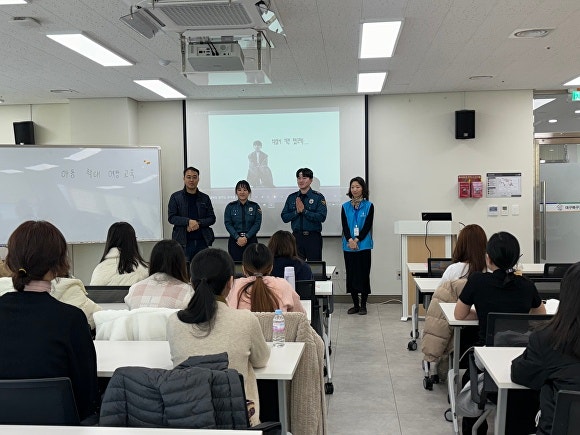
Why Child Welfare Campaigns Matter for Foreigners in Korea
Welcome, international readers! Have you ever wondered how Korea is addressing child welfare and safety? Understanding these initiatives can not only enhance your experience living in Korea but also provide insight into societal values that prioritize children's well-being.
Recently, Daegu's North District Office launched the 'North District Child Abuse Prevention Day' campaign, emphasizing the importance of a safe nurturing environment for children. For foreigners, especially those in multicultural families, this initiative holds crucial information that can aid in their integration and help them navigate childcare in Korea.
🌏 What's happening in Korea? (Quick overview)
On March 19, the North District Office of Daegu held a campaign focused on preventing child abuse, involving various local organizations, including the police and child protection agencies. The event aims to create awareness regarding child abuse and promote safe parenting practices throughout the community. This campaign will be held quarterly, highlighting the continuous effort of local government to address such critical issues.
💡 Why this matters for foreigners? (Impact analysis)
This campaign is particularly relevant to multicultural families in Korea. Information about child protection in multiple languages increases accessibility for those who might struggle with the Korean language. These families can benefit from understanding local laws, support systems, and effective parenting methods that resonate with their cultural backgrounds.
📌 How to take advantage of this? (Step-by-step guide, if applicable)
If you are a foreign national with children in Korea, participating in these community programs can significantly improve your understanding of the local environment. Here are steps you can take:
- Attend community workshops focused on child care and rights.
- Utilize resources provided in your native language to familiarize yourself with Korean childcare practices.
- Engage with local community centers and schools that support multicultural families.
🇰🇷 Understanding Korea's system (Cultural & bureaucratic insights)
Korea has extensive laws and regulations regarding child welfare, reflecting a strong societal commitment to protecting children's rights. The government collaborates with NGOs to educate parents and caregivers about healthy child-rearing practices. Understanding these laws and cultural attitudes can empower you to seek help effectively and advocate for your children if needed.
🌟 Tips for foreigners living in Korea
Here are a few tips that might help you navigate the parenting landscape in Korea:
- Join local expat groups to share experiences and parenting tips.
- Learn basic Korean phrases related to child welfare and education to bridge the language gap.
- Stay informed about community events focusing on family welfare and child safety.
🔮 What's next? (Future trends & additional insights)
Looking ahead, initiatives to promote child safety are likely to grow, incorporating more diverse languages and cultural practices. As Korea continues to embrace its multicultural identity, the inclusion of various parenting styles and backgrounds is expected to become part of public awareness campaigns, benefiting not just local Koreans but also diverse communities across the country.
🇰🇷 Learn Korean from this Article!
Improve your Korean language skills with these key phrases from the article:
🔤 Korean Phrase 1: "아동학대 예방"
🔤 Pronunciation: "Adonghakdae yebang"
🔤 English Translation: "Child abuse prevention"
🔤 Usage Tip: Use this phrase to discuss or inquire about child protection initiatives.
🔤 Korean Phrase 2: "안전한 양육 환경"
🔤 Pronunciation: "Anjeonhan yangyuk hwan-gyeong"
🔤 English Translation: "Safe nurturing environment"
🔤 Usage Tip: This phrase is helpful when emphasizing the need for a secure atmosphere for children.
🔤 Korean Phrase 3: "다문화 가족"
🔤 Pronunciation: "Damunhwa gajok"
🔤 English Translation: "Multicultural family"
🔤 Usage Tip: Use this term when discussing family backgrounds in the context of child welfare.
🙋 Essential FAQs for Foreigners
Can foreigners participate or apply?
Yes, foreigners, especially those in multicultural families, are encouraged to participate in community programs and campaigns aimed at child welfare.
Do I need to know Korean for this?
While knowing Korean can be helpful, many resources are provided in various languages at these events to ensure inclusivity.
Where can I find official details?
You can find more about local campaigns and resources on government websites or community centers focused on child welfare.
In conclusion, these initiatives in Korea showcase a commitment to child welfare that reaches beyond language and culture. If you have children or are planning to start a family in Korea, engaging with these programs can be highly beneficial. We encourage you to explore and participate actively!
📱 Get the BeraKorean App & Stay Updated!
Want to improve your Korean skills and stay informed about life in Korea? Download the BeraKorean app for exclusive content:
- 📱 Android: Download on Google Play
- 🍎 iOS: Download on App Store
📺 Follow us on BeraKorean YouTube for Korean lifestyle & language content!
🌏 Visit berakorean.com for more updates, news, and insights on living in Korea.
🔗 Read the Original Korean Article
Want to dive deeper? Check out the original article here:
📢 Tags
#KoreaNews #LifeInKorea #ForeignersInKorea #KoreaOpportunities #KoreaLiving #LearnKorean #KoreanLanguage